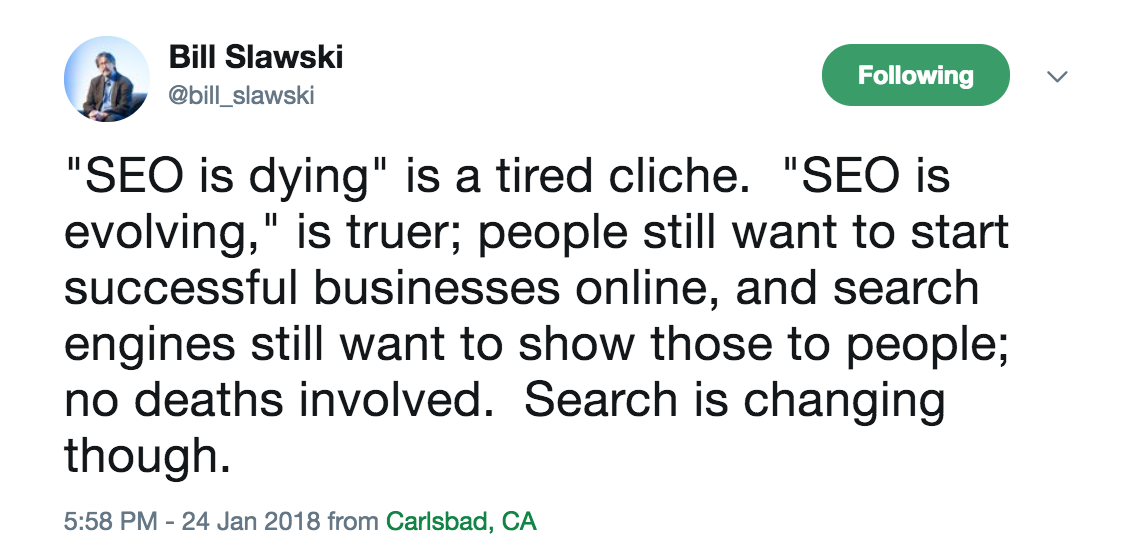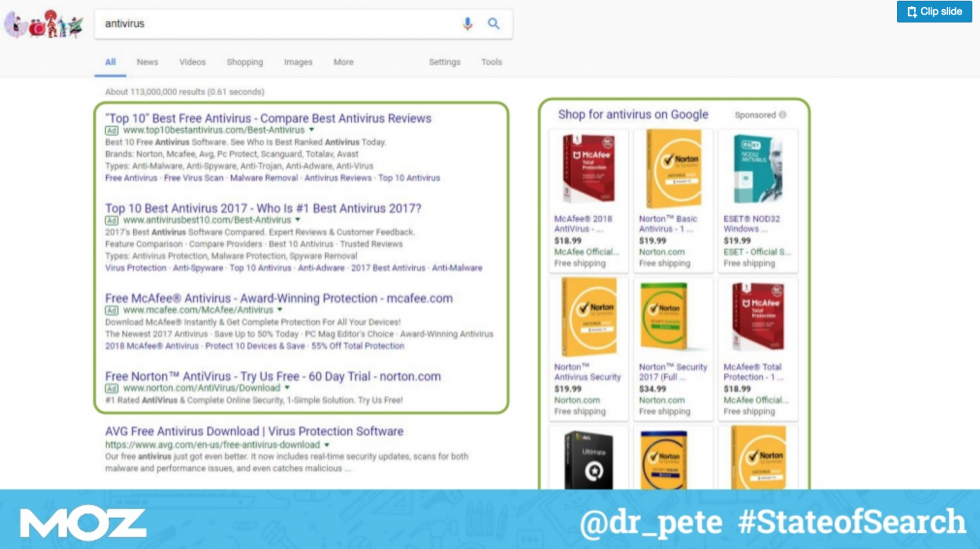As I’ve gotten older, I find myself talking more about the “good old days.”
The days before I had any real responsibility.
The days before I had bills or a cell phone, and selfies weren’t even a thing.
The days when we had to walk to school in the snow, uphill, both ways.
Remember that?
Those good old days also extend to search engine optimization (SEO).
For those who have been in the search industry for over a decade, we reminisce about the days when a few keywords in the title tag and $100 worth of directory links put you in Position 1.
The days when search results were simply 10 blue links and if you weren’t first, you were last.
SEO was easy and life was good.
Ah, yes. That was really something.

The ‘Good Old Days’ of SEO
I suppose as we age, it becomes inevitable we look back on the simpler times. But, we aren’t in those days anymore and I’ll be honest, I don’t think that’s a bad thing.
In the so-called good old days of SEO, anyone could call themselves an SEO practitioner.
I mean, the first company I worked for guaranteed rankings and sold SEO programs to sites without websites (and not because we were going to work with them to develop an SEO-friendly site). How can you optimize a site that doesn’t exist?!?
That was just the start of the problem.
SEO became synonymous with “snake oil” and Google had to start issuing penalties to stop us from gaming their algorithm. So it went.
As each year passed and search engines like Dogpile, Altavista, and Lycos dropped off the face of the web, Google got bigger, got smarter, and our jobs got harder.
Here we are in 2018 and that’s no different. Updates happen essentially every day. New search features roll out continuously.
We are now thinking about AI and voice assistants. Heck, even our industry’s own Danny Sullivan has moved to the other side (Google).
Times are certainly changing and our jobs are not getting any easier.
With the good old days of SEO come and gone, does this mean that we are now in the worst of times?
I would say no and I think this tweet from Bill Slawski really captures the why:

SEO isn’t what it used to be and as a result, we have to evolve.
Everyone can no longer be an SEO practitioner.
That doesn’t make it bad. In fact, I’d say it’s forcing us to be marketers instead of just SEO professionals.
Here’s why that’s a good thing.
People Buy Products, Not Search Engines
When I started in search, our content strategy was to put the target keyword on a page as many times as possible. Sure, the content sounded a little weird but hey, it ranked!
That is no longer the case and I couldn’t be happier.
Why?
Because search engines don’t pay the bills. People do.
Good marketers must understand the people who are buying their products.
Good marketers must understand the challenges their customers face and be able to provide them with the information that addresses those challenges.
The Google that exists today is smarter and, as a result, we have to be smarter.
We have to answer the questions our customers are asking.
We have to think beyond a singular keyword and we have to help businesses understand that to perform better in search, they have to perform better as a business.
Keywords Don’t Make You a Brand
Just because you have the right keywords on a page doesn’t mean you are the best option for the customer. It doesn’t mean your site is better, your content is better, or your brand is better.
When I was in college, I majored in Public Relations. I loved the idea of being out there, promoting a brand. I loved the idea of pitching reporters and I dreamt of one day becoming the spokesperson for the New York Knicks.

Now, I’m glad that dream didn’t work out (maybe the Knicks can get above .500 this year) but what has happened in the interim, is Google forced SEO pros to think about the brand as a whole.
How do we acquire links these days?
The agency I work for focuses on:
- Getting our clients bylines.
- Utilizing existing partnerships.
- Generating customer visibility.
- Creating great content.
We focus on tactics that not only help build links but help build the strength of the brand.
The cool part is, those PR dreams I had? There’s a lot of overlap now between what SEO pros do and what PR teams do.
I guess I’m sort of living my dream after all.
There’s Life Beyond Google
A few years ago, people started talking about Search Experience Optimization. I hate the term but I love the concept.
Consumers aren’t just searching on Google. We are now asking for referrals on Facebook, using online chat, texting our friends, and spending hours reading reviews.
I’m constantly trying to figure out how people search across platforms and how I can ensure my client is there when they do.
I have to think about the buyer journey, where each location falls in that journey, how to ensure we have the right content for each part of the journey, and even more importantly, I have to figure out how to tie it all together.
To me, this is a good thing. Google is evolving and making it harder for us as humans to rank our sites organically.
Just take a look at this screenshot from Dr. Pete Meyers’ State of Search presentation.

Those are all paid ads! We have to think beyond Google.
Well, Is it the Best Time or Worst Time?
I don’t know exactly what the future of SEO has in store but if time has shown us anything, it’s that SEO will only continue to change and we as marketers will once again need to evolve.
Take for example what is already over the horizon: voice search.
If you ask some of the folks out there, we are closer than ever to a screenless ecosystem and how we optimize for that presents an even greater challenge.
That’s exciting!
We are in a time where we are not just watching search evolve but we are watching technology evolve at a rapid rate. It might be challenging but I don’t think I’d want it any other way.
The good old days may be long gone but we are living in a time of change and that feels pretty good to me.
More SEO Resources:
Image Credits
In-Post Photo # 1: geralt/Pixabay.com
In-Post Photo # 2: Free-Photo/Pixabay.com
Screenshot taken by Casie Gillette, January 2018
Subscribe to SEJ
Get our daily newsletter from SEJ’s Founder Loren Baker about the latest news in the industry!
